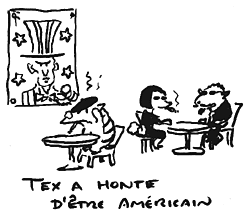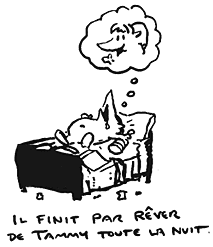Prepositions
prepositions with infinitives
The infinitive is the verb form generally used after a preposition in French. À (to) and de (from, about) are the most common prepositions in French. In many expressions, the choice of the preposition à or de before an infinitive is purely idiomatic; that is, it is unrelated to meaning. In such cases, one must memorize which preposition is used.
à + infinitive
When the following verbs are followed by an infinitive, the preposition à is required.
| Tex a du mal à trouver l’inspiration. | Tex finds it difficult to find inspiration. |
| aider à, to help to | encourager à, to encourage to | |
| s’amuser à, to have fun at | s’habituer à, to get used to | |
| apprendre à, to learn to | hésiter à, to hesitate to | |
| arriver à, to succeed in, to manage to | inviter à, to invite to | |
| s’attendre à, to expect to | se mettre à, to start to | |
| avoir du mal à, to find it difficult to | se préparer à, to prepare to | |
| chercher à, to try to, to attempt to | renoncer à, to give up | |
| commencer à, to start to | réussir à, to succeed at | |
| continuer à/de, to continue to (either à or de) |
servir à, to be used for | |
| se décider à, to make up one’s mind to | tenir à, to be anxious to, to be eager to |
de + infinitive
When the following verbs are followed by an infinitive, the preposition de is required.
| Tex arrête d’écrire, parce qu’il rêve d’embrasser Tammy. | Tex stops writing, because he is dreaming of kissing Tammy. |
| (s’)arrêter de, to stop | oublier de, to forget to | |
| choisir de, to choose to | permettre (à quelqu’un) de, to permit someone to |
|
| conseiller de, to advise to | persuader de, to persuade to | |
| se contenter de, to content oneself with | se presser de, to hurry to | |
| continuer à/de, to continue to (either à or de) |
promettre de, to promise to | |
| décider de, to decide to | proposer de, to propose to | |
| s’efforcer de to try hard to, to endeavor to | refuser de, to refuse to | |
| essayer de, to try to | rêver de to dream of | |
| s’excuser de, to apologize for | se soucier de, to care about | |
| finir de, to finish | se souvenir de, to remember to | |
| mériter de, to deserve, to be worth |
Most idiomatic expressions with avoir also require de + infinitive:
| Oh, Tex a l’air de rêver. | Oh, Tex seems to be dreaming. | |
| Tex a peur de se réveiller. | Tex is afraid of waking up. | |
| Tex a envie de dormir. | Tex feels like sleeping. | |
| Tex a besoin de se reposer. | Tex needs to rest. | |
| Tex a honte d’être américain. | Tex is ashamed of being American. | |
| Tex a tort d’être susceptible. | Tex is wrong in being touchy / should not be touchy. |
|
| Tex a raison d‘être fier. | Tex is right to be proud. |

The infinitive may be used to complete the sense of an adjective or a pronoun. Generally infinitives following a noun or adjective are preceded by the preposition de. (Tex est content de voir Tammy dans ses rêves érotiques. Tex is glad to see Tammy in his erotic dreams.)
![]()
However, adjectives and nouns are followed by the preposition à + infinitive to indicate a passive sense or a function: “cette eau est bonne à boire” (this is drinking water), “ce livre est amusant à lire” (this book is fun to read), “c’est triste à voir” (it’s a sorry sight), “c’est difficile à dire” (this is difficult to say).
pour, afin de, avant de, sans, par + infinitive
The infinitive expresses purpose when it is used after pour or afin de (in order to).
![]()
In the case of avant de (before) and sans (without), the English translation is often a conjugated verb (before they left), or a present participle (without speaking), rather than the English infinitive.
![]()
The infinitive follows the preposition par (by) after the verbs commencer (to start) and finir (to finish).
| pour/afin de | Tex s’allonge sur son lit pour lire. | Tex lies down on his bed to read. | ||
| avant de | Avant de s’endormir, Tex lit toujours un poème érotique. | Before going to sleep, Tex always reads an erotic poem. | ||
| sans | Il ne peut pas dormir sans rêver de Tammy. | He can not sleep without dreaming of Tammy. | ||
| par | Il finit par rêver de Tammy toute la nuit. | He ends up dreaming of Tammy all night long. |

après (past infinitive constructions)
The infinitive of avoir or être plus the past participle of a verb is used after the preposition après (after) to describe a preceding action in the past. Note the past participle agreement in past constructions with être.
| Après avoir rêvé de Tammy, Tex retrouve son inspiration. | After dreaming of Tammy, Tex finds his inspiration again. | |
| Après être devenue la muse de Tex, Tammy est passée à la postérité! | After becoming Tex’ muse, Tammy is immortalized! |

